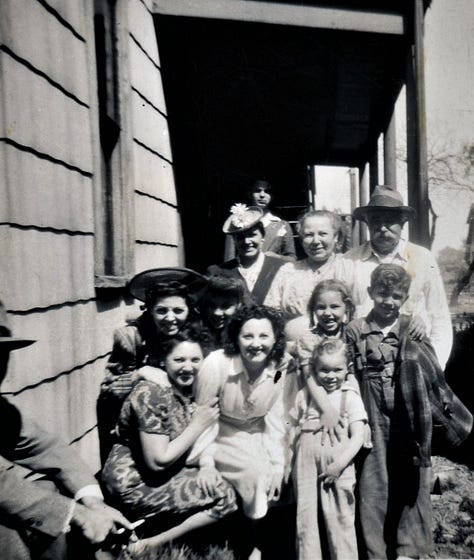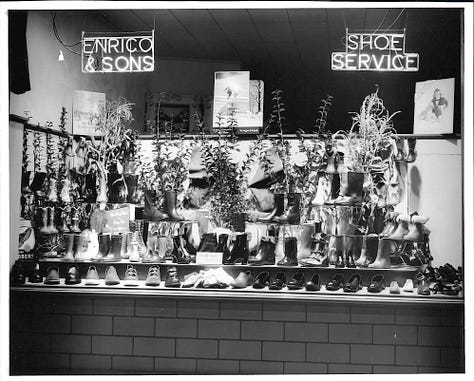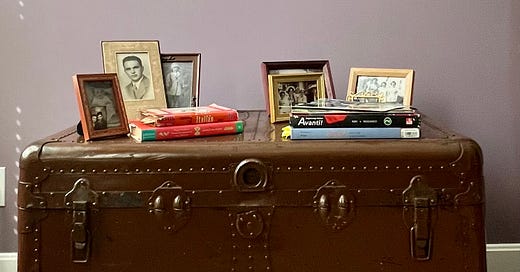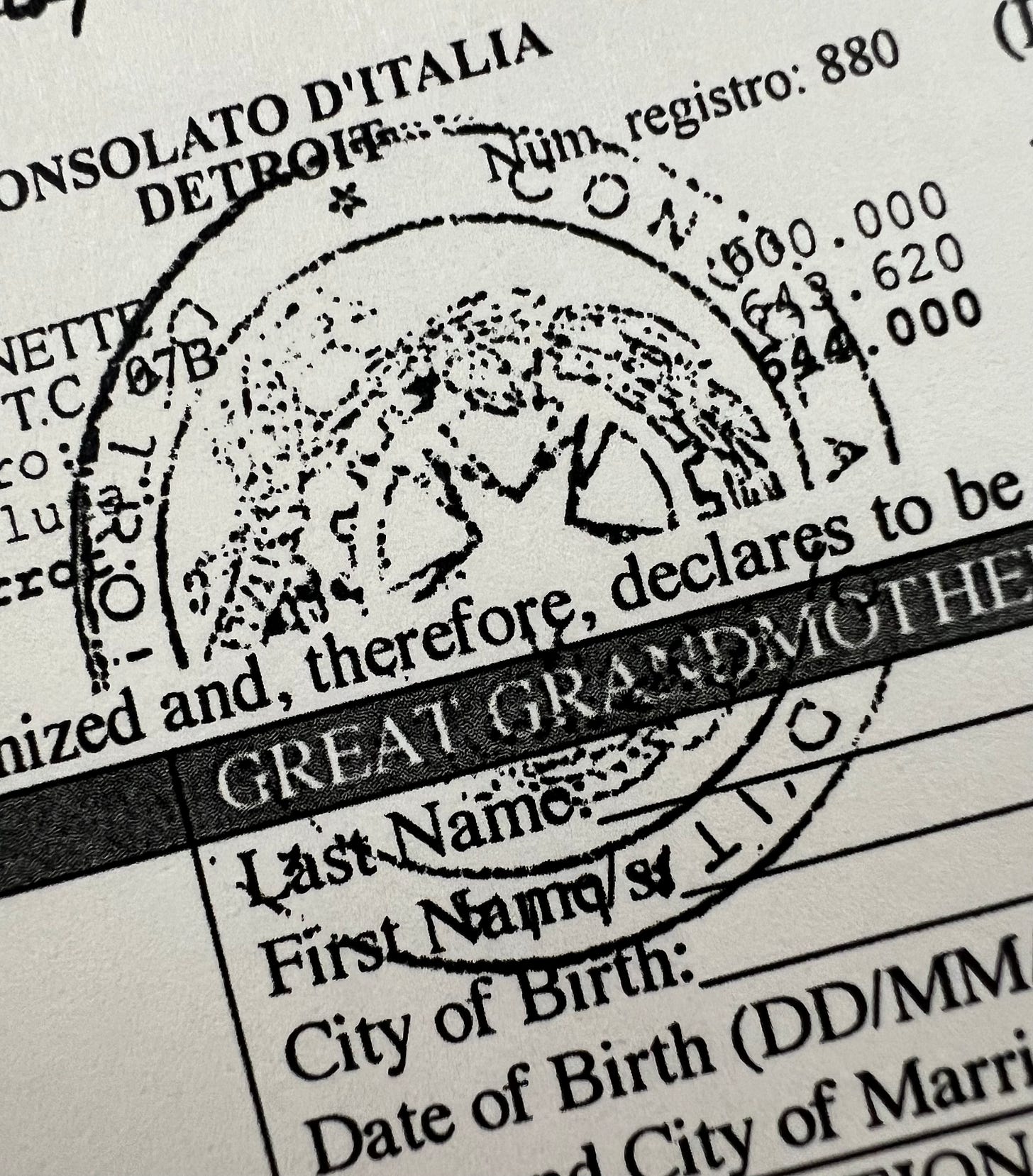I rummage around the vast brown trunk in my office where inside manila files are tucked neatly like little birds into nests, old shoe boxes with clipped recipes are stacked as if they still contained soles, and one Amherst Drug Mart bag holds my high school years in newsprint.
Clint Smith, writer, poet, activist, and author of How the Word is Passed, writes about D.C.’s National Museum of African American History and Culture, “My grandmother’s history exists within this museum.”
This brown chest—ported across Italy through the port of Naples, sailed into Ellis Island and was battered about on a rickety train bound for Ohio—is my museum.
My Italian grandparents’ history exists within this trunk.
For years, this trunk sat in the basement of my parents’ homes, gathering folded laundry, a box of dust rags, and rattling canning supplies. Inside, emptiness. When my parents moved, when my father died, the trunk came alive. Home for old vinyl albums, tax records to keep handy, and the remains of my school years.
Then came a shift in my life. My mother dead. I was hit by a car. Recovery. A pandemic.
Like many who cleaned out garages and basements like one prepares their soul for salvation, soon, albums were cleared out, tax records disposed of. The Drug Mart bag was all that existed. In the place of the rest came file folders: Vincenza Jean Januzzi, Raffaela Scurti DeLuca, Vincenzo Giuliani, Luigi DeLuca, Ettore Januzzi, Stella Mazza Januzzi, Enrico Januzzi, the Shoe Store.
Five years later, I would add one more manila file folder, one that calls to mind the current plight of immigrants navigating life in our country at this current moment. An attempt at citizenship in a foreign country.
*
Prior to the striking of the virus upon our breaths, that January of 2020, I’d decided to return to Italian language classes. Something opened inside of me. A seeking had begun.
One that involved an assessment of my reason for being—cataloguing of my ancestor’s official papers that either proved or disproved their existence in Italy and / or America.
Why is it never enough, to be without papers (WOP is slang for Italians without papers)? To prove we exist because our feet have walked the earth?
Omar El Akkad writes in One Day, Everyone Will Have Always Been Against This, “It’s come to shape the way I think about every country, every community: Whose nonexistence is necessary to the self-conception of this place, and how uncontrollable is the rage whenever that nonexistence is violated?”
Papers embody our existence, more so than our corporal substance. Lack of papers are intended to erase us.
Yet even now, papers be damned. Any of us, including someone seeking to rough in the edges of her grandparents’ stories, could be pulled aside. Digital crumbs of our searches, of our social media posts, are traced.
For the African Americans Clint Smith writes about, their proof of existence is contained within a museum. A museum that the administration is hell bent on erasing. Many of them arrived without papers. What need would they have had for them in the lands from which they were taken? There’s the fool’s proof a tattoo might symbolize involvement in a gang and cause an irreversible deportation to El Salvador. What about the intangible proof based an appearance at a protest for Palestinians? And finally, censorship and the disabling of my In^^^gram account for writing on Thre^ds about the film No Other Land. Photos, contacts, disappeared.
A friend whose family members live out of country and may not be able to visit, a friend who is not American but working toward it, asked, Is this what America is, who Americans really are?
Yes.
*
Timothy Egan, author of A Fever in the Heartland: The Ku Klux Klan's Plot to Take Over America, and the Woman Who Stopped Them, spoke last week at the Mercantile Library. In comparing this day and age to the 1920s, and further back, he said, the American experiment was about we were all in on one concept, we were all together. You’re wrong, I wanted to shout from my seat. The singular concept was based on the consolidation of land, power, and money for the white male.
El Akkad again, writes “Rules […] all exist so long as their resistance is convenient to the preservation of power. Otherwise, they, like all else, are expendable.” Does this sound like the world we are living in? And yet he writes from the vantage point of the Middle East.
Read any account of black man who returned to America from the Civil War or World War I only to be subjected to Jim Crow laws.
Immigration reform in the 1920s didn’t happen to keep immigrants out of the United States. Rules were instituted to keep the wrong kind of people from coming. People like my grandparents. Southern Italians. Wrong color of skin, I suppose. And yet Italy now is nearly overrun with white tourists, snapping pics of their Aperol spritz while sunbathing on the Italian riviera.
On Easter, the night before Pope Francis’ death, the Holy Father called the Catholic church of Palestinian congregants in Gaza to ask if they needed anything. It was one of the Pope’s regular calls. On the same holiday, our U.S. president wrote on his Truth Social account a despicable post. I share it in hopes to reach those who might still be swayed.
Father James Martin, American priest and writer, once said on an Adriana Trigiani podcast, “Everyone will be forgiven.” Perhaps this is where religion has gone wrong.
Anger still bubbles up within when I hear the echoes of 2016 from people in my orbit. “My vote was a throwaway vote.” “I voted for Jill Stein.” “How do you know who I voted for?” Chastised as I was for speaking up on a platform designed as such. How dare I? Prior to the most recent election of 2024, there was “I’m not a racist or anything, but….” Or a female saying, “I don’t want a female for president.” Presently, we have “I’m on a news and social media diet for Lent.” And a recent favorite, “If we could all be more kind.”
When Trump took office again in January of 2025, his slew of executive orders left the majority of the world speechless. In the same way, a person widowed after a freak accident of their spouse is without words, grief settles in before realizing how this loss will impact every facet of your life. Only some are now coming to see it happen. And not simply on their grocery bills.
My first mother-in-law and I talked on the phone the other day. We’ve both declared, at every turn, we’re tired. And we’re talking. The words are coming from journalists, from the writers, the artists. From everyday people who are tired of the relentless slew of sludge coming from the present administration.
*
Given the strong family ties that Italians and other immigrants represent, we should remind ourselves America was the answer. It was never the solution. Ancestors left families in their homeland, uncertain of any reunification, fled war torn countries and dictatorship regimes. Humans are a species of animals my husband always says. They will always run away from a dangerous situation. Akkad again writes, “The harbor is never as safe as the water is cold.”
Immigrants understand the proverbial temperature of the water.
I’ve often wondered if there’s a computation that calculates who takes the biggest draw from America’s bank accounts. It’s not the immigrant. It never was. They were and are the ones who continue to shore it up.
What the ancestors carried was all they acquired. Cards they toted around each and every day in their wallet to proof their worthiness of being in America. Pay stubs that demonstrated they pay taxes. Medical receipts for losing an eye while working on railroads that increased the wealth of the rich. Days when they nearly lost their homes they had worked hard to buy. Letters from shoe manufacturers informing them, as business owners, they should raise their prices. No one will notice. Wink, wink.
What is in the new file folder? What have I acquired?
Nineteen pieces of official papers: My maternal grandfather’s baptismal record, his marriage record to my grandmother, her birth record, his non-existence of U.S. naturalization papers, her naturalization papers. My mother’s birth certificate, her name change, her birth date change, my father’s birth certificate, his name change to Januzzi, their marriage certificate, their death certificates. My birth record, birth and death certificates of first husband, our marriage document, birth certificate of second husband and our marriage document.
On the same day I was censored and my social media account disabled, I drove to the Italian consulate in Detroit. I clutched the backpack containing that file to my chest, heart thumping. The file stirred in me something I hadn’t felt. Asked by the agent why had I pursued Italian citizenship, I said, “I wanted to complete the circle of my grandparents’ journeys. I wanted to reclaim what they left behind and bring it to the light, make new friendships and relationships, find new ways of thinking.”
She stamped my file. Asked me to send her my book when it’s been published.
*
That file, that trunk is my museum. A museum of how power tried to remove the opportunities for my grandparents. Not to be equated to the enslaved African Americans, or now, the erasure of their history through executive orders. In 1705, U.S. law stated, “All negroes, mulatto, and Indian slaves are considered real estate.” Land = money = power. All immigrants ask for is contained in this quote hanging in the African American museum.
Today, many of our structures resemble the early years of the American experiment, including the KKK which believed the greatest threat to “White Race” was Jews, Roman Catholics, Blacks, Hispanics, and Asians (in that order) according to Hooded Americanism: The History of the Ku Klux Klan by David J. Chalmers.
What Immigrants carried was freedom in all its beautiful, messy forms. An antithesis to white America.
Ohio was a hotbed of KKK activity in the 1920s, ranking in the top five of KKK members. I imagine individuals like my grandparents in northern Ohio attempting to exist within that framework of hatred. A Youngstown State professor gave an account of when the KKK came to attack the town of Niles, Ohio, a town with a predominant Italian population, and how the townspeople responded. “A number of years later when I was talking to my father about the event. I said, ‘Can you explain it? Can you tell me why this happened?’ His response was, ‘We were different. We were strangers. And to them, we were in a strange land, but we’re Americans.'”
I returned from the consulate in Detroit and combed through the files again. Touched the paperwork that was dear to my ancestors. That held some semblance of being between the crackles of the folds. Yet paper is made of tree dust. How easily it disintegrates into thin air.



No parent or grandparent migrates to the United States and imagines their offspring would be so naive to say, “I don’t pay attention to the news.” My grandparents held fast to news of home and news of opportunity. News of war and peace. News that enabled them to find some shard of hope. A shard used to sharpen their skills, knowledge, and their Americanism against anyone who told them otherwise.
April 1 – National Italian American Foundation, Ambassador magazine: NIAF on Location: Cincinnati. Visit: niaf.org for more information.
Edible Ohio Valley publishes amazing content about our food pathways and the people that pass through them. Here’s one of my favorites I wrote about Spelt.
May 10 – Climate Writing Workshop. My colleague Elaine Olund leads this climate writing workshop as part of Studio Kroner - All Else Pales - 2.
If you want to know more about All Else Pales 2, you can read my work in Soapbox Cincinnati.
May 13 – Caring for the Caregiver writing experience. Giving Voice Foundation with Pauletta Hansel and Annette Januzzi Wick. In-person. Free. Continues with three other sessions. Sign up here.
May 14 - An Evening of Poetry - All Else Pales 2, Studio Kroner. Poetry readings about the environment Anthology will be available for purchase. Sponsored by Just Earth Cincinnati, a catalyst, empowering residents to make the Cincinnati region a vibrant community in which just, reciprocal and harmonious relationships with the Earth, her people, her creatures, and her ecosystems are cultivated.More information.
August 12 – Caring for the Caregiver writing experience. Giving Voice Foundation with Pauletta Hansel and Annette Januzzi Wick. Virtual. Free. Continues with three other sessions. Sign up here.
November 14 – Caring for the Caregiver writing experience. Giving Voice Foundation with Pauletta Hansel and Annette Januzzi Wick. In-person. Free. Continues with three other sessions. Sign up here.









I'm behind on reading some of your writings but i do try to keep up. thank you for writing this and for sharing this. i also enjoyed ready your piece in the Ambassador!